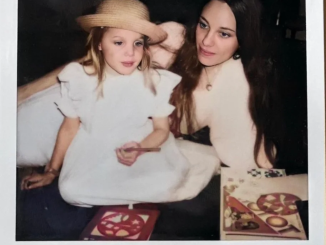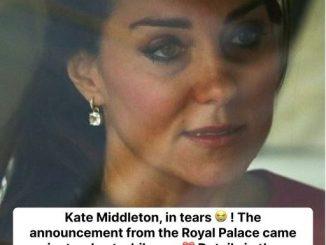A TV presenter with a traditional Māori face tattoo has calmly replied to negative comments from a viewer, proudly standing up for her cultural heritage and identity.
Facial tattoos often spark debates online. Some people think tattoos should only be on the body, while others understand and appreciate their cultural importance.
Oriini Kaipara, 41, made history when she became a newsreader for New Zealand’s Newshub. She is the first primetime TV news presenter to wear a moko kauae, a special facial tattoo for Māori women.
The Māori are the indigenous people of mainland New Zealand. They see moko kauae as important symbols of their heritage and identity. These tattoos, traditionally on the lips and chin, show a woman’s family ties, leadership, and honor her lineage, status, and abilities.

Oriini Kaipara. Credit: Oriini Kaipara / Instagram.
Despite receiving praise, one viewer named David expressed his dislike for Kaipara’s moko kauae in an email to Newshub.
He wrote, “We continue to object strongly to you using a Māori newsreader with a moku [moko] which is offensive and aggressive looking. A bad look. She also bursts into the Māori language which we do not understand. Stop it now,” according to the Daily Mail.
But Kaipara didn’t let David’s negative words stop her. She bravely shared screenshots of his messages on her Instagram story and responded calmly.
“Today I had enough. I responded. I never do that. I broke my own code and hit the send button,” she wrote on her Instagram story alongside a screenshot of David’s message.

Kaipara didn’t just share screenshots of David’s email, she also responded to him. She explained that his complaint wasn’t valid because she hadn’t broken any rules for TV.
She also corrected David’s spelling mistake. He called her tattoo a “moku” instead of “moko”.
In her email back to him, Kaipara said, “I think you don’t like how I look on TV. But tattoos and people with them aren’t scary or bad. We don’t deserve to be treated badly because of them.”
She asked him to stop complaining and to try to understand better. She even joked that maybe he should go back to the 1800s if he couldn’t accept people with tattoos.

Despite David’s negative words, Kaipara says she mostly gets nice comments, and mean ones are rare.
In an interview with the New Zealand Herald, Kaipara talked about how it’s important to have more Māori people in important jobs. She said, “The fact that my existence makes some people upset shows why we need more Māori people in every job.”
Kaipara’s calm response reminds us how important it is to be proud of who you are, even when people are mean. She’s inspiring others to be proud of themselves and stand up to unfair treatment.
What do you think of this story? Share your thoughts in the comments!
Grandma’s Old Bowel Cleanse Recipe: A Natural Way to Detox

Grandma’s remedies are known for their simplicity and natural healing properties. This old recipe for a bowel cleanse is a testament to that wisdom. By using ingredients like cucumber, lemon, ginger, parsley, and dried rose petals, this cleansing drink is designed to flush toxins from the digestive system and improve overall gut health. Let’s dive into the details of this effective natural cleanse that promises to clear out impurities in just three days.
Why These Ingredients?
Cucumber: With its high water content and fiber, cucumber helps to hydrate the body and cleanse the gut.
Lemon: Known for its detoxifying properties, lemon aids digestion and stimulates the liver to release toxins.
Ginger: This root has powerful anti-inflammatory properties and can help stimulate digestion and soothe the stomach.
Parsley: Rich in vitamins and minerals, parsley is excellent for detoxifying the kidneys and improving digestion.
Dried Rose Petals: Not only do they add a pleasant flavor, but rose petals also have a gentle laxative effect that helps cleanse the bowels.
Ingredients
- 1.5 liters of water (about 7 1/2 cups)
- 1/2 cucumber, thinly sliced
- 1 lemon, thinly sliced
- 10 grams of fresh ginger, peeled and minced
- 20 grams of fresh parsley, roughly chopped
- 10 grams of dried rose petals
Instructions
Prepare the Ingredients:
- Rinse all fresh produce under cold water.
- Thinly slice the cucumber and lemon.
- Peel and mince the ginger.
- Roughly chop the parsley.
Combine Ingredients:
- In a large pitcher, combine the sliced cucumber, lemon, minced ginger, chopped parsley, and dried rose petals.
- Pour 1.5 liters of water over the ingredients.
Let it Infuse:
- Cover the pitcher and allow it to infuse in the refrigerator overnight. This duration helps the water absorb all the flavors and properties of the ingredients.
Use:
- Starting the next day, drink this infused water throughout the day for three days. Make sure to consume it all each day, replacing it with a fresh batch each evening.
Tips for Success
- Stay Hydrated: In addition to drinking the infused water, keep drinking regular water throughout the day to help flush your system.
- Eat Light: For best results, eat light meals during these three days. Focus on vegetables, fruits, and whole grains to give your digestive system a break.
- Monitor Your Body: Listen to your body during this cleanse. If you feel any discomfort or unusual symptoms, consider consulting with a healthcare provider.
Conclusion: Refresh and Reset Your System
This old-fashioned bowel cleanse recipe is a gentle yet effective way to help cleanse your digestive system and remove toxins from the body. With its natural ingredients and straightforward preparation, it’s a testament to the enduring wisdom of home remedies passed down through generations. Give Grandma’s recipe a try for a natural approach to revitalizing your health.



Leave a Reply